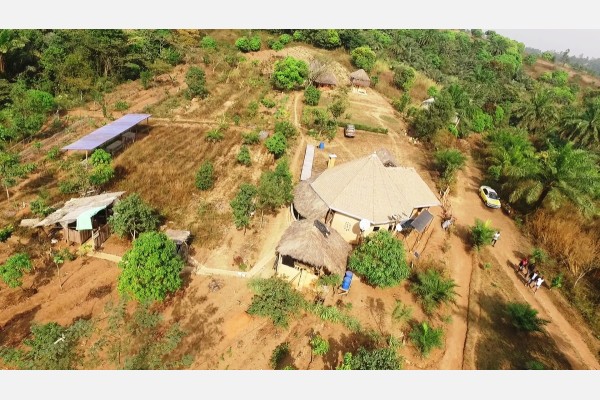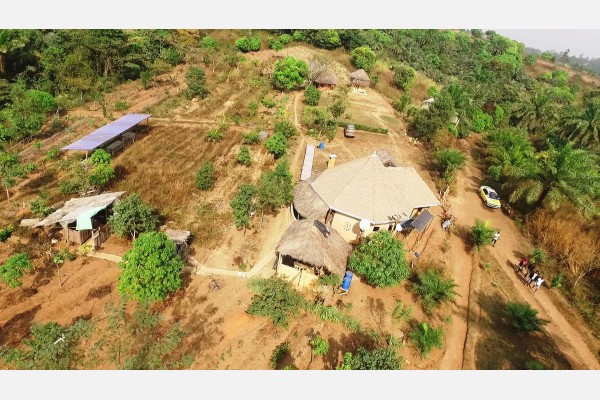Repository of Practices

Ecovillage Development Program
Secondary GCM Objectives
Dates
Type of practice
Summary
There is a growing understanding in the sustainability movement that sowing seeds of economic opportunity today for youth migrants, can yield socioeconomic and environmental benefits tomorrow. This is why social enterprises allow for experimentation and innovation from where best practices, ideas, and solutions emerge; towards speeding up local as well as international development initiatives. Furthermore, in alignment with objectives of the Global Compact on Migration (GCM) social enterprises are better equipped to strengthen the participatory governance of resources, as they facilitate the equal distribution of wealth; for migrants and refugees in their host communities and countries. Such initiatives are therefore essential, if we are to experience a true sustainable development of people and communities across the world, with regards to the Global Compact on Migration.
Founded in 1996, Better World Cameroon (BWC), is a grassroots non-profit headquartered in Bamenda, Cameroon. Our work focuses on facilitating the successful transition toward sustainable development in Africa and across the world. Our work lays special emphasis on exchange and connectivity, to enable knowledge sharing from multicultural collaboration between young people in Africa and their counterparts from other parts of the world, towards establishing a more progressive understanding of issues pertaining to migration, and to further co-create migration friendly platforms for the socioeconomic development of all migrants. Over the years, we have developed flagship programs such as the Ecovillage Development Program and High Value Agricultural Products (HVAP) that are specialized towards developing local sustainable agricultural strategies for mitigating the global food crisis and extreme poverty, which are the foundational causes behind the global migration crisis. By aligning these programs with the objectives of the GCM, we are a corner stone in the pivotal push for enabling safe and orderly migration across the globe.
These programs utilize indigenous knowledge systems to build institutional capacity for initiating processes necessary to establishing vibrant socially conscious, economically and environmentally sustainable local economies. Furthermore, by establishing Cooperative structures as incubators at the center of the program, we are able to utilize research based data, to support local business initiatives/projects that are best suited to the needs of communities involved in the integration and rehabilitation of migrants/refugees, further meeting the objectives for safe and orderly migration established by the GCM. These projects range from Ecological farming (Permaculture), Ecological Building (Earth Building), sale of herbal products and handicraft (Direct trade) as well as being a suitable platform for eco-tourism. Finally, the Ecovillage development program was developed with the support of the Global Ecovillage Network (GEN), with funding from the European Union, Federal Ministry for Economic Cooperation and Development (BMZ).
Organizations
Main Implementing Organization(s)
Detailed Information
Partner/Donor Organizations
Benefit and Impact
The Ecovillage development program supports cities, states and communities, to accelerate development outcomes in the integration of both migrants/refugees and their host communities, as it helps to increase coordination amongst different local sectors for migration issues, including through the creation of viable alternatives to the architype silicon valley style blueprint for innovation, by introducing a community development friendly type collaboration model, that serves as a springboard from where nascent social impact ideas are nurtured and allowed to bloom into cutting edge innovative solutions which serve as the bedrock of green value-chain developmental frameworks; thus enabling multi-sectoral stakeholder mobilization, in support of locally produced goods and services that are designed to benefit both migrants/refugees and the communities, states and countries that decide to host/integrate them.
Key Lessons
Another challenge is the need to sensitize and incentivize the different stakeholders that involved in setting up the Ecovillage development program. Because Ecovillages are primarily community based and most communities around the world are weary of and not used to focusing on migration related issues, it automatically creates challenges for any project to be implemented. Therefore, in order to ensure that these stakeholders are at peace with everything pertaining to the implementation of such a project, it is important to leverage the collaborative efforts with local authorities such as Mayors, Governors and other focal points; who will be in charge of facilitating the take up process of the project, among the migrant integrating communities, cities and states
Recommendations(if the practice is to be replicated)
Also, the ecovillage development program can be tailored to multiple contexts thus ensuring that both migrants, refugees and other assistance networks such as non-governmental organizations (NGO’s), International Organizations, civil society organizations (CSO’s), as including migrant/refugee associations, are fully equipped to adequately contribute to the Ecovillage establishment process in their states, cities and host communities.
Innovation
Our work focuses on empowering and positively impact the lives of migrants/refugees, by leveraging innovative technologies in education, leadership development, skill building and civic engagement. We work with individuals and organizations, towards providing support that enables them to realize their potential through developing leadership, purpose, discipline and culture. This is a measure geared towards increasing the impact they have in the communities around them. The ultimate goal is to raise a new generation of leaders, who are equipped to provide practical cutting edge solutions for establishing sustainable local green economies.
Additional Resources
Media
An ecological building in Bafut
Additional Images
Date submitted:
Disclaimer: The content of this practice reflects the views of the implementers and does not necessarily reflect the views of the United Nations, the United Nations Network on Migration, and its members.
More Related Practices:
- Strengthening the capacities and frameworks to collect data and evidence on migration, the environment and climate change (MECC) in Mexico
- IOM Engages Youth on Benefits of Migration at the 13th African Games in Accra, Ghana
- CLIMB Database
- Seguro Integral de Salud (SIS) – Protección financiera en Salud para peruanos y extranjeros residentes en el Perú
- Instituto Nacional Penitenciario | “Interno Universitario y Estudiando sin Fronteras”
Peer Reviewer Feedback:
*References to Kosovo shall be understood to be in the context of United Nations Security Council resolution 1244 (1999).
Newsletter
Subscribe to our newsletter.


